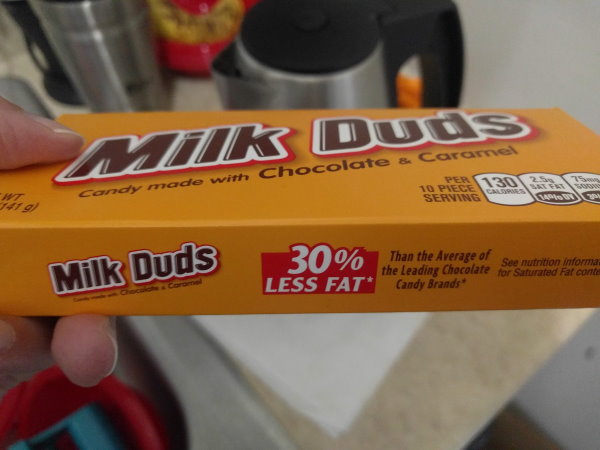
I get really irritated by those sneaky, lying weight-loss liars.
I was at a church function recently where the icebreaker included naming your favorite movie (on this particular day mine was Groundhog Day) and reaching into a little tub full of movie candy and pulling out a box for your prize.
I pulled out this box of Milk Duds.
I didn’t look at it very closely until a few days later, and I noticed this surprising marketing angle: “30% less fat!”
Which begs the question, “30% less fat than what, exactly?”
(This is a good question to ask any time “more” or “less” opinions come into play: Compared to what? For example, “You should be more successful.” Compared to what? “You shouldn’t talk so much.” Compared to what?)
When you look closer, it says it’s 30% less fat than other candy bars.
On our weight loss journeys, many of us have been taught to watch out for fat, because fat contains more calories than carbs or protein. Maybe Milk Duds have less fat than a Hershey bar–because chocolate has more fat than caramel, or taffy, or whatever the heck is inside a Milk Dud. That doesn’t mean they have fewer calories than a chocolate bar, less sugar than a chocolate bar, or are healthier than a chocolate bar.
That’s the first level of misdirection, but there’s more
Fat still doesn’t have anything to do with the sneaky, lying weight-loss liars. No, that would have to do with servings.
One serving of Milk Duds is 10 pieces, or 130 calories. Now, who counts out ten pieces and stops there? There are 4.5 servings in the box. That means this box of Milk Duds has 585 calories–more than a Big Mac!
Now, if I’m going to eat something, I want it to be something that makes me feel satisfied when I’m done. A Big Mac has a much better chance of making me feel satisfied than does a box of Milk Duds. And I don’t like Big Macs, so no thank you.
I’m not a dietician or nutritionist–I’m a hypnotist, which means I pay attention to language and suggestion, and “30% less fat” makes Milk Duds sound like a healthy option. What it actually means, though, is “Look over here at the amount of fat! Don’t flip the box over and look at the back, because then you would learn that just one box a week would make you 8 pounds heavier over the course of a year.”
I have friends who are marketers, and they have products to sell. There is nothing deceptive about saying, “130 calories per serving.” But we live in a busy world, and while we may have the habit of asking, “How many calories?” once we have that answer, a lot of us stop reading. “Oh, 130 calories? That’s not much.”
Focus on what benefits you
It’s just as easy to build a habit of taking one more step and getting one more piece of information (“How many servings per box?”) that could help us make a new decision.
Little things can make a big difference. If you’d like to jump on a free strategy call together, we can brainstorm ideas about how to set up the mental automation to make healthy habits simple.